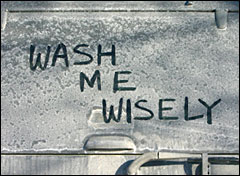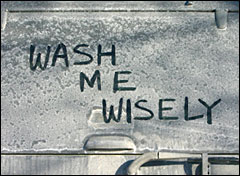Dear Umbra,
I recently bought a new-to-me car (fuel efficient!). It’s the nicest car I’ve ever owned, so I want to keep it well-maintained and clean. What are some environmentally friendly ways to keep my car clean, both inside and out? I’d rather not use gross chemicals and harsh soaps. Will good ol’ vinegar and baking soda do for the inside panels? How about natural soaps for the outside?
Carolyn
Marblemount, Wash.
Dearest Carolyn,
My firsthand knowledge about car washing wouldn’t fill a tin can. Honestly, I’ve often wondered if it was necessary. Or, I used to wonder until I got a co-owner who drinks coffee, and a passenger who spills milk. Let’s just say I have been happy about the recent freezing temperatures, which seem to mute the smell.

We talked about car washes a while back, and the importance of using a commercial car wash if one is available near you. Commercial washers are required to recycle their water and manage the soapy toxins therein. Whereas home washers who don’t take care will use a tremendous gallonage of water (new coinage! just call me Shakey the Bard) and the sudsy run-off may enter storm drains, damaging downstream life.
That said, driving ridiculously far to find a commercial wash is a poor choice, obviously. Also, from the reading I just did on your behalf, I learned that serious car washers consider commercial establishments damaging to the paint finish. The whole point of washing your car is to protect the paint coating, lengthen the life of the paint, defend the undercarriage from salty destruction, and — of course — keep up appearances.
Ecologically, then, our car washing priorities are: First, don’t own a car. Second, use a commercial car wash near our home. Third, use one we happen to pass on the way to somewhere else. Fourth, wash the car at home using some or all of the following suggestions (which come from Car Talk [PDF] and others).
Several of the eco-cleanser brands sell car wash materials, including Ecover and Simple Green (also Eco Touch, which I’d never heard of). You might also use Dr. Bronner’s or a similar mild soap, but do not use dish liquid (could remove the wax), and avoid anything with the usual suspects such as petroleum distillates and phosphates. Follow the dilution instructions as you prepare your warm bucket of suds — you shouldn’t need much soap, and the water shouldn’t be hot, as that will take off the wax. Also have a second bucket of clean water to hand, several soft sponges, and all-cotton towels or rags. Park the car on grass or dirt if you are able, or perhaps you have a permeable-surface driveway.
Wet the car in order to rinse off any loose grime and scratchy debris. Then hand wash it in patches, starting at the roof and working down the sides to the ground. Keep your sudsy sponge clean, and either dry it as you go to avoid splotchy bits, or give it an all out rinse at the end and then hand dry.
As to the inside, I must refer you to the Car Talk tips referenced above, which are detailed (ha ha). I’m running out of space. Two interesting tips: read the manual, and don’t scrub shoddy upholstery too hard. I think vinegar and water will be fine on most of the interior, especially the windows.
I’ve also heard that keeping the car tidy on an ongoing basis, and dealing with coffee spills as they occur rather than after nine months of winter, are good ways to avoid using any cleanser in the first place. Could just be an urban myth.
Stainedly,
Umbra



